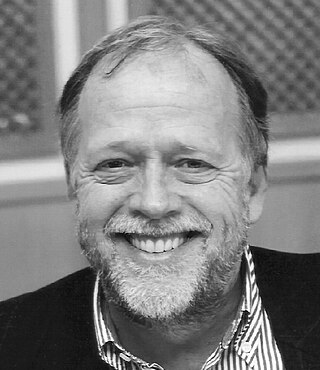Mario Davidovsky was an Argentine-American composer. Born in Argentina, he emigrated in 1960 to the United States, where he lived for the remainder of his life. He is best known for his series of compositions called Synchronisms, which in live performance incorporate both acoustic instruments and electroacoustic sounds played from a tape.

The alto flute is an instrument in the Western concert flute family, the second-highest member below the standard C flute after the uncommon flûte d'amour. It is the third most common member of its family after the standard C flute and the piccolo. It is characterized by its rich, mellow tone in the lower portion of its range. Unlike the flute and piccolo, it is a transposing instrument in G, although it uses the same fingerings as the C flute.
The bass flute is a member of the flute family. It is in the key of C, pitched one octave below the concert flute. Despite its name, its playing range makes it the tenor member of the flute family. Because of the length of its tube, it is usually made with a J-shaped head joint, which brings the embouchure hole within reach of the player. Its soft dynamic range means in large ensembles it is easily obscured unless amplified or lightly scored; however its unique timbre in the low register can be very effective, especially in solo works, small ensembles, and flute choirs. The "bass flute in F" produced by Kotato & Fukushima is a contra-alto flute.
James Dillon is a Scottish composer who is often regarded as belonging to the New Complexity school. Dillon studied art and design, linguistics, piano, acoustics, Indian rhythm, mathematics and computer music, but is self-taught in composition.
Éric Gaudibert was a Swiss composer.
Víctor Varela is a Venezuelan-Swedish composer based in Gothenburg. His compositions include works for orchestra, vocal and instrumental chamber music, with electronics and computer devices.

Alla Zahaikevych is a Ukrainian composer of contemporary classical music, performance artist, organiser of electroacoustic music projects, musicologist. Her name is alternatively spelled Alla Zagaykevych on all releases and in texts which are in English.

Lior Navok is an Israeli classical composer, conductor and pianist. He was born in Tel Aviv. His music has been performed internationally by orchestras and ensembles including the Oper Frankfurt, Nuernberg Opera, Israel Philharmonic Orchestra, Boston Modern Orchestra Project, and the Tanglewood Festival Orchestra. Amongst the awards he has received are those from the Israel Cultural Excellence Foundation and the Massachusetts Cultural Council. He has also received awards from the Fromm Music Foundation, Lili Boulanger Memorial Fund Award, and Israel Prime Minister Award. In 2004, he was one of seven composers awarded commissions for new musical works by the Serge Koussevitzky Foundation in the Library of Congress and the Koussevitzky Music Foundation.
Gary Kulesha is a Canadian composer, pianist, conductor, and educator. Since 1995, he has been Composer Advisor to the Toronto Symphony Orchestra. He has been Composer-in-Residence with the Kitchener-Waterloo Symphony (1988–1992) and the Canadian Opera Company (1993–1995). He was awarded the National Arts Centre Orchestra Composer Award in 2002. He currently teaches on the music faculty at the University of Toronto.

Michael Obst is a German composer and pianist.
Adina Izarra is a Venezuelan musician, music educator and composer.
James Harley is a Canadian composer, author, and professor of music born in Vernon, British Columbia. His creative output consists of orchestral, chamber, solo, electroacoustic, and vocal music.
Allan Gordon Bell, is a Canadian contemporary classical composer.
Sergio Fernández Barroso is a Cuban composer, performer and professor.
Scott L. Miller is an American composer best known for his electroacoustic chamber music and ecosystemic performance pieces.




